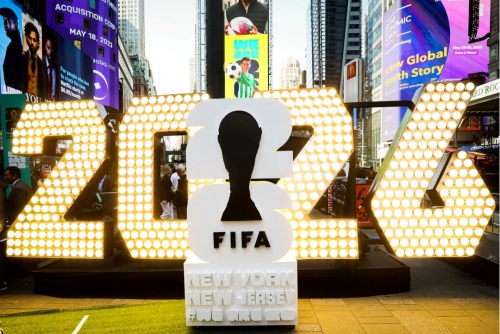


TDT | Manama
Email : hussainm@newsofbahrain.com
Soccer Steps into the American Spotlight
With just a year to go before the 2026 FIFA World Cup kicks off across North America, soccer is experiencing a quiet but profound transformation in the United States. No longer a peripheral pastime, the sport known globally as "the beautiful game" is carving out real ground in a country long defined by its affection for American football, baseball, basketball, and ice hockey.
The shift comes not just in the stands but also in the nation's infrastructure, talent pipeline, and cultural consciousness. And with 11 of the tournament's 16 host cities located in the U.S., the countdown to the world's biggest sporting event is sparking both excitement and reflection.
A Long Way Since 1994
The last time the United States hosted a men's World Cup, in 1994, Major League Soccer (MLS) didn't yet exist. The final, a goalless draw settled on penalties between Brazil and Italy in front of over 94,000 fans at the Rose Bowl, hinted at potential, but the sport remained largely on the fringe.
Former U.S. international Eddie Pope, who played in MLS's inaugural season in 1996, remembers those early days vividly -- and not entirely fondly. "(At) Real Salt Lake, we literally -- our locker room was in a strip mall," he recalled. "You didn't know where we were going to train some days."
Now serving as chief sporting officer at MLS Next Pro club Carolina Core FC, Pope sees a different world emerging. "The players are better, the coaches are better. The referees are better -- everything's better. And it took time, but I would say that we've moved at lightning speed."
Atlanta Takes Centre Stage
Nowhere is that transformation more visible than in Atlanta, which was passed over as a World Cup host in 1994 as it prepared to stage the Olympics two years later. In 2026, the city will host eight World Cup matches -- including a semi-final -- and will become the new home of the U.S. Soccer Federation's first-ever national training centre.
The move marks a symbolic shift in American soccer's geographic and strategic centre of gravity. "You've a men's league that's been developed. You have international games coming in droves to the United States," said Tim Zulawski, president of AMB Sports & Entertainment, the sports enterprise led by Atlanta Falcons owner Arthur Blank.
"And ultimately, what you really have is kids having idols and people to look up to," he added, speaking to the sport's long-term potential.
The economic impact is expected to be substantial, with officials projecting $500 million in revenue for Atlanta alone. But perhaps more importantly, the city will become a cultural focal point for a sport still defining its identity on American soil.
Challenges Still Remain
Despite the infrastructure gains and growing public interest, challenges persist. The U.S. men's national team continues to grapple with inconsistency, and new head coach Mauricio Pochettino faces mounting pressure to deliver results in time for the tournament.
But even amid sporting concerns, optimism prevails. The World Cup offers more than just a platform for competition -- it provides a once-in-a-generation opportunity to deepen soccer's roots across America.
FIFA President Gianni Infantino remains bullish. Three years ago, he predicted soccer would become the region's top sport following the 2026 edition. Whether or not that bold vision materialises, the trajectory is clear: American soccer is no longer on the sidelines. It's stepping onto centre stage.
Your email address will not be published. Required fields are marked *
No comments yet. Be the first to comment!